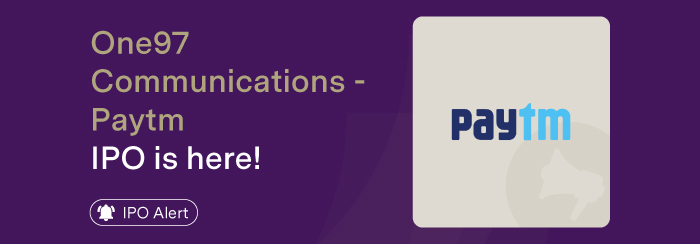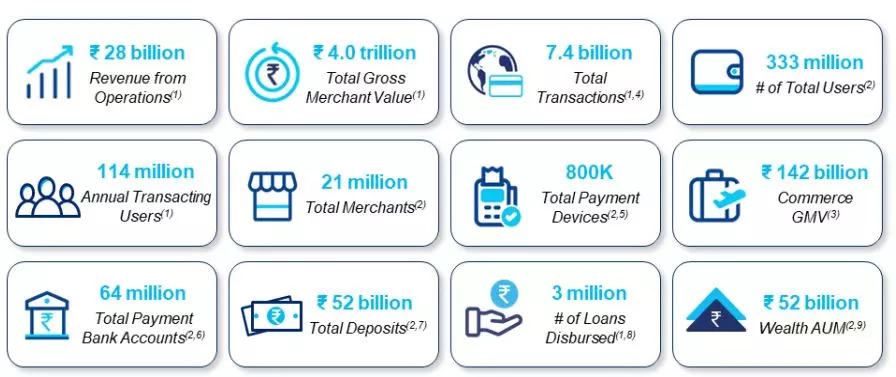
One97 Communications Ltd., the parent company of the payments network Paytm, conducted its first offering on Monday, intending to raise Rs 18,300 crore, making it the most extensive public offering in Indian market history. During the three-day auction, investors can purchase shares for Rs 2,085-2,150 per share.
The IPO consists of a shares issue worth Rs 8,300 crore and a sale of existing shares worth Rs 10,000 crore by existing shareholders. One97 Communications is projected to be valued at $20 billion (Rs 1.5 lakh crore).
Antfin (Netherlands) Holding BV, which sells Rs 4,700 crore worth of shares, SVF Panther (Cayman) Ltd., which sells Rs 1,689 crore worth of claims Alibaba.com is significant investors are selling their stakes for sale. According to the regulatory filing, Singapore ECommerce Pvt. sells shares worth Rs 785 crore, and founder Vijay Shekhar Sharma sells shares for Rs 402 crore.
The issue of Paytm IPO:
Rs 8,300 crore (new issue) Rs 10,000 crore is being offered for sale. Re 1 per share is the face value. The price range is Rs 2,085 – 2,150. Morgan Stanley India, Goldman Sachs (India) Securities, Axis Capital, ICICI Securities, JP Morgan India, Citigroup Global Markets India, and HDFC Bank are the lead managers for the transaction.
Paytm, formerly One97 Communications is a financial services firm that specialises in digital transactions. Aside from that, the company lends to consumers and merchants through partners, and it provides insurance, mutual funds, and gold investments through tie-ups. It is entering the direct marketing of insurance products with the acquisition of Raheja QBE. Payment services have produced a much more significant percentage of One97 Communications’ revenue in the preceding three years, reaching three-quarters in FY21.
The company’s business continues to be the most diverse in India’s payment ecosystem. It serves 33.3 crore customers with payment, commerce, and cloud services, and financial services. It has a 2.1 million-strong merchant base.
Paytm claimed the draught red herring prospectus, “We assist our merchants develop their company by offering tools that allow them to accept payments, recruit and keep clients, enhance their business processes, and access financial services.”
In the future, the firm is “very optimistic” about its merchants business, according to Vijay Shekhar Sharma, managing director, in an interview with BloombergQuint.
While it would continue to provide lending products through partnerships, Sharma said at a news conference announcing the IPO that the business will not apply for a non-bank financing licence. According to Sharma, Paytm Payments Bank, the sole financial institution inside the Paytm ecosystem, may apply for a small finance bank licence.
According to One97’s admission, the firm is losing money and plans to continue to do so for the foreseeable future.
“We anticipate to continue to suffer net losses for the foreseeable future,” the prospectus read, adding that “we may not attain or sustain profitability in the future.”
According to the company’s prospectus, revenue from operations increased 62 per cent year over year in the first quarter of FY22. In FY21, it had a cumulative loss of Rs 1,701 crore, down from Rs 2,942 crore in FY20. For the three months ending in June, the loss was Rs 381.9 crore.
Contribution profit and margin is the metric that One97 wishes to emphasise. Revenue from operations less variable costs like payment processing fees and marketing or promotional expenses equals contribution to profit. The contribution margin is the percentage margin generated by dividing contribution profit by revenue from operations.
In FY21, the firm made a contribution profit based on this criteria.
The Offer’s Objects 
Paytm plans to use the cash of the IPO to:
- Grow and strengthen the Paytm ecosystem, primarily through consumer and merchant acquisition and retention, and provide them with better access to technology and financial services.
- Make investments in new company ventures, assets, and strategic alliances.
- Spend money on essential company needs.
Risks to Consider
The following are the main risks associated with the offer: a changing regulatory environment in India, resulting in additional compliance costs in the future. Consumer behaviour might be influenced by recessionary economic cycles, a prolonged economic downturn, a worsened economy, greater unemployment, rising interest rates, or other industry-wide cost pressures, resulting in a drop in Paytm’s sales and profitability.
Due to reasons outside Paytm’s control, such as business closures, bankruptcy, financial difficulties, transfers of merchant accounts to rivals, cancellations, and account closures, the number of merchants operating with the firm may decline. Any flaws in Paytm’s or its partners’ IT infrastructure might significantly impact the company’s operations.
Furthermore, any data breach might have a significant negative influence on the company’s future. The firm continues to lose money and can’t guarantee when it will become profitable to potential investors.
Why has Paytm’s massive IPO gotten such a response from major investors?
The initial public offering (IPO) of leading online payments business Paytm, which opened for subscription on Monday, got off to a poor start, with only 18% of shares sold.
According to stock market statistics, as of 5 p.m. on Monday, the retail component was the most heavily subscribed, at 78 per cent, while institutional investors and high-net-worth individuals received just 6% and 2%, respectively. The second day’s subscription was somewhat higher. However, this was mainly due to demand from individual investors.
As of 4 p.m., they had purchased the retail component over 100%, but the portion allocated for Qualified Institutional Investors (QIBs) had been subscribed 45 per cent. They had only subscribed to the shares intended for non-institutional investors 4%.
According to the subscription statistics, it appears that more prominent investors did not compete hard for the Paytm IPO. It is in sharp contrast to recent IPOs, which have included famous names like Nykaa, Zomato, and others.
However, we should emphasise that the Paytm IPO is enormous compared to other recent public offerings.
BIG INVESTORS’ LACK OF APPETITE
One probable explanation for the IPO’s poor reception from large investors might be the IPO’s value, which, although being lower than projected, has not gone down well with many experts.
Given the company’s inability to deliver profit after so many years in business, many analysts believe the IPO is expensive. Even though the firm has managed to reduce its losses and diversify, it has yet to profit. It is something that many experts have mentioned while discussing value.
Paytm’s shares are valued at Rs 2,080-2,150 crore at the high end of the pricing range, valuing the firm at $1.39 trillion. A fresh issuance of Rs 8,300 crore and an offer for sale (OFS) of up to Rs 10,000 crore are part of the company’s share sale.
ANALYSTS’ REACTIONS WERE MIXED
It’s worth noting that the Paytm IPO was met with mixed reviews. Some experts have remained unconcerned about the situation, claiming that the company’s long-term operations may be lucrative.
However, experts feel that the shares are priced too high. “Paytm is priced at 49.7 times FY21 sales at the high end of the pricing band,” said Jyoti Roy, equities strategist at Angel One Ltd. While Paytm’s values may look high, the company is well-positioned to gain from the exponential rise in mobile payments between FY21 and FY26. Thus the price is warranted.”
FINANCIAL PROBLEMS
The company’s finances are in jeopardy, as it has never turned a profit. The cash flows from operating activities were negative in FY19, FY20, and FY21 due to rising operational losses and increased working capital demands.
Detrimental cash flows in the future, according to ICICI Direct, might hurt the company’s operations and financial position.
Another reason why major investors are wary of the Paytm IPO is because of statements from some fund managers who feel the IPO would be a “very high-risk investment” that will not increase when it hits the stock exchanges.
Paytm, according to Rakhi Prasad, an investment manager at Alder Capital, might be a high-risk play. “Nothing is going to happen in the near future.” “I would believe demand will come through, but perhaps not in the same way that we’ve seen in other firms,” Prasad added.
On the contrary, the country’s digital landscape’s future development potential has left a lot of observers optimistic about the IPO.
PREMIUM DROP IN GEY MARKET
A dramatic decline in the grey market premium (GMP) of the company’s shares might be a factor. According to market experts, Paytm’s a bonus on the grey market, an illegal marketplace where unlisted shares of a firm trade, has decreased to Rs 58.
The grey market premium estimates how much a company’s shares will be worth after being listed on the stock markets. On November 18, Paytm is expected to make its stock market debut.
Article Proofread and Edited by Shreedatri Banerjee




